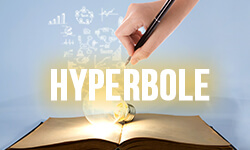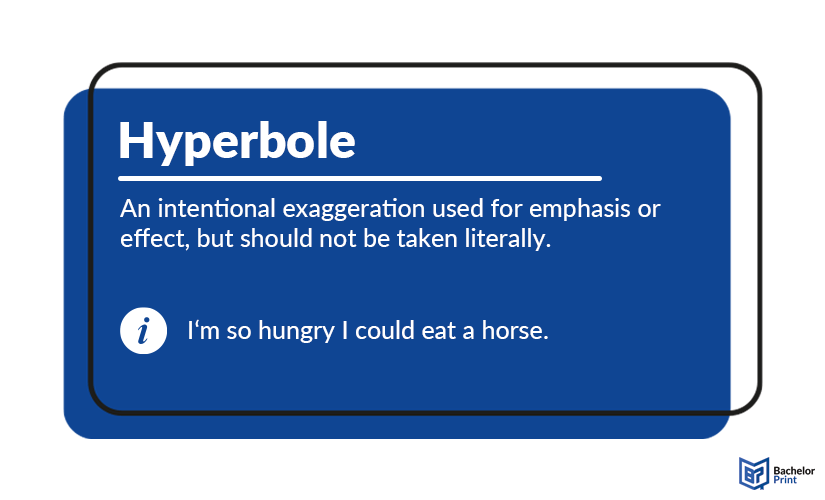
Hyperbole, an expressive literary device characterized by exaggeration for emphasis or effect, has been long employed in various forms of discourse. However, its role in academic writing has always been a subject of debate. This article delves into analyzing its purpose and evaluating its potential for academic discussion, so you gain a nuanced understanding of this rhetorical device.
Definition: Hyperbole
What is a hyperbole? The definition of hyperbole is a rhetorical device or figure of speech in which exaggeration is used for emphasis or effect. Unlike a literal statement, hyperbole is not intended to be taken as an accurate representation of reality. Instead, it serves to stress the significance or extremity of a particular situation, emotion, or characteristic. This form of embellishment is commonly used in various types of communication, including everyday conversation, literature, and even in some scientific contexts to capture attention or underscore a point. However, due to its exaggerated nature, it must be used carefully to avoid misleading the audience in formal and factual settings like academic writing.
In this example, the speaker doesn’t actually mean that they could sleep for an entire year. They are using hyperbole to emphasize how exhausted they are.

Etymology
The origin of hyperbole is in the ancient Greek language. It is derived from the word “hyperbolē” and divided into two parts:
- “hyper-“ means “beyond” or “above”
- “bolē” means “a throw”
Combined, the term essentially means “to throw beyond” or “exceed”. In this sense, the term encapsulates the idea of “going beyond” what is normal, expected, or true to make a point or emphasize an idea.
This concept has been around for thousands of years, and it was one of the figures of speech studied and analyzed by ancient scholars like Aristotle. Over time, the term was adopted into Latin and later into various European languages, including English, preserving its original meaning of deliberate exaggeration for effect. Today, this kind of rhetorical device continues to be commonly employed in language and literature. It’s used to intensify statements and evoke emotional responses.
Usage
Hyperboles can serve different purposes depending on the medium in which they appear. By employing them, writers and poets can create a more engaging or emotionally resonant experience for their audience. Whether it’s to emphasize a point, paint a vivid picture, or add layers of meaning, this figure of speech is a versatile tool that can add depth and complexity to various forms of written expression. Here’s how this figure of speech is often used in various aspects, more precisely literature and poetry.
Literature
A hyperbole can be used to exaggerate certain traits or features of a character, making them more memorable or highlighting their significance.
Hyperbolic statements can serve to magnify emotions or situations, making them more relatable or intense for the reader.
Sometimes, hyperboles are used for a comedic effect. Describing a situation as wildly exaggerated can lighten the mood of a story and be funny.
Additionally, hyperbole can be employed to highlight the absurdity or extremity of social norms, practices, or issues. This exaggerated portrayal can make the issue more apparent and provoke thought, encouraging people to question why a given social norm or practice exists in the first place.
Poetry
A hyperbole in poetry can enrich the visual or emotional imagery of a poem.
This kind of rhetorical device can set or underscore the tone or mood of a poem.
In some cases, a hyperbole can be symbolic, representing broader themes or messages.
Like in literature, exaggerations can be used for emphasis in poetry.
Hyperbole examples
It’s a versatile device that can serve various functions depending on its context. Here are some examples of different forms of hyperbole across different aspects, including literature and poetry, along with explanations of what the author or speaker likely intended.
Literature
In this case, the type of exaggeration emphasizes the devastating feeling of loss the character experiences. The absence is not literally like losing all one’s teeth, but amplifies the emotional weight.
Poetry
While Frost doesn’t actually mean the world will end in fire or ice, the hyperbole serves to dramatize extreme outcomes, each representing different human emotions or behaviors (fire for desire and ice for hatred).
Everyday conversation
Clearly, the bag does not weigh a ton, but the exaggeration is used to stress how heavy the bag feels to the person carrying it.
Advertising
Red Bull does not truly give you wings, but the phrase exaggerates the energy-boosting effect of the drink, aiming to leave a memorable impression on consumers.
News and journalism
While the concert was probably not actually heard miles away, this exaggeration might be used to emphasize how loud and impactful the event was.
Each of these examples uses hyperboles to intensify the message and make it more memorable or emotionally resonant. Whether it’s to heighten emotion, underscore a point, or simply make an expression more impactful, they serve as a powerful tool in language and communication.
Hyperboles in academic writing
In general, hyperboles are used sparingly in academic writing because the genre prioritizes objectivity, precision, and substantiated claims. Exaggeration can potentially mislead readers or create a sense of bias, thereby undermining the credibility of the academic work.
Dos
- Understand your audience
- Use sparingly
- Clarify with facts
- Use in appropriate contexts
- Be transparent
Don’ts
- Don’t mislead
- Don’t use in data presentation
- Avoid in abstracts or summaries
- Don’t rely on them
- Don’t use in formal research
Tips for effective usage
-
Be clear
Make it obvious that you are using this exaggeration for effect. This can be achieved through explicit statements or the context. -
Limit use
Limit the use by reserving hyperboles for points you really want to emphasize. Even then, use them sparingly! Overusing them dilutes the impact and may cloud your argument. -
Pair with evidence
Immediately follow the exaggeration of an extreme issue or situation with concrete evidence that supports your statement. -
Audience awareness
Furthermore, know your audience. Some disciplines may be more open to rhetorical devices. Some others may not tolerate any form of exaggeration. -
Consult guidelines
Always consult the style or submission guidelines while writing your academic essay. Typically, they will answer what types of language are acceptable.
In summary, this type of rhetorical device is generally not recommended for academic writing. This is due to its potential to create a bias or mislead the reader. However, there are specific cases where it’s appropriate to use rhetorical devices, such as exaggerations. Here it should be considered whether the impact is beneficial. If it is used, then it should be employed sparingly, carefully, and transparently. Moreover, it should always be paired with supportive evidence, so your academic integrity is not risked.
Hyperbole vs. meiosis vs. litotes
Below is a table that outlines the differences between three rhetorical devices that are commonly confused. Each of these serves a unique purpose and is used to achieve specific effects.
| Rhetorical device | Definition | Example | Purpose/effect |
| Hyperbole | Deliberate and obvious exaggeration used for emphasis | I'm so hungry, I could eat a horse. | To intensify feelings, create emphasis, or provoke humor |
| Meiosis | Intentional understatement used for ironic effect | It's just a scratch = A large wound | To downplay something, often humorously or ironically |
| Litotes | A positive statement is expressed by negating its opposite | He'not a bad singer = He sings good | To subtly emphasize or make a point, typically in an ironic way |
Printing Your Thesis With BachelorPrint
- High-quality bindings with customizable embossing
- 3D live preview to check your work before ordering
- Free express delivery
Configure your binding now!
Is “literally” a hyperbole?
The word “literally” is not inherently a hyperbole, but it is typically used hyperbolically in casual speech and writing. When you say something is “literally” true, you mean that it is true in the most straightforward, factual sense. There is no metaphor, no exaggeration, and no ambiguity. The statement is true in a concrete sense.
The person being referred to is indeed the author of a book on the subject of quantum physics.
However, it became a controversial issue when people began using “literally” as “figuratively” in modern colloquial speech. “Figuratively” means that the statement is metaphorical and not to be taken as a factual claim. It’s a way of speaking that uses symbolic or metaphorical language to illustrate a point, express an emotion, or describe a situation.
This means that while the person didn’t actually write a book on quantum physics, but is so knowledgeable on the topic that it’s as if they wrote a book on it.
Synonyms
Here are some synonyms for hyperbole:
- Amplification
- Embellishment
- Exaggeration
- Magnification
- Overemphasis
- Overkill
- Overstatement
- Stretching the truth
- Tall tale
| Synonym | Example |
| Allegory | The novel uses a farm as an allegory for political corruption. |
| Figure of speech | She often used a figure of speech to make her point more vivid. |
| Idiom | Saying “it's raining cats and dogs” is a popular idiom to describe heavy rain. |
Note: These terms share similarities with the term, but they are not always perfect substitutes. The context in which you are using the word will determine the most suitable synonym.
FAQs
The simple meaning of a hyperbole is an exaggerated statement used to make a point or emphasize a feeling. For example, saying “I’m starving” when you’re just famished.
Here are five examples:
- I’m so tired, I could sleep for a year.
- This bag weighs a ton.
- I’ve told you a million times.
- He’s faster than a speeding bullet.
- I’m dying of laughter.
No, a metaphor is not a hyperbole. A metaphor is a figure of speech that directly compares two different things to suggest a resemblance, while a hyperbole is an exaggerated statement used for emphasis. Both are rhetorical devices, but they serve different purposes.
It’s hard to definitively say what the “most popular” hyperbole is, but one that is commonly used is “I’m so hungry, I could eat a horse”. This exaggerated statement is often used to emphasize extreme hunger.
Yes, hyperbole is a form of exaggeration used intentionally for emphasis or effect. However, not all exaggerations are considered hyperboles because the latter is considered a specific rhetorical device used in literature and language.
